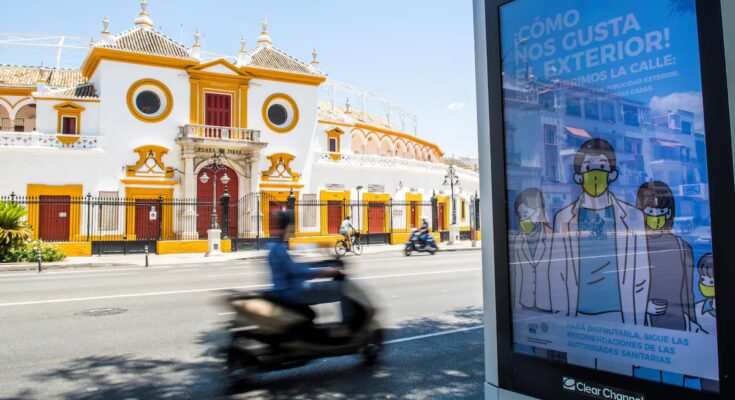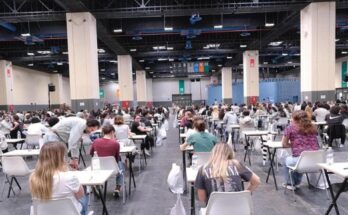The Royal Maestranza of Seville is a corporation founded in 1670 by King Charles II and ratified in 1730 by the first Bourbon monarch, Philip V, who granted it the privilege of celebrating bullfights to finance its activities. It was born for equestrian art and preparation for war, but the passage of time has converted that objective into a meritorious charitable, social and cultural work. As a result of this royal license, the Pagés company is the owner of the Seville bullring.
It is an entity born at the end of 1932, by the will of the Catalan entrepreneur Eduardo Pagés, who on that date signed an agreement with the teachers for the management of the square. He died in 1945 and, after some legal vicissitudes, his daughter, Carmen Pagés, took over the management and passed it on to her husband, Diodoro Canorea, who was the entrepreneur of the Seville arena until his death in January 2000.
He was succeeded by his son, Eduardo Canorea, and son-in-law, Ramón Valencia. The first left the company in 2015, the second still remains at the helm of the company created by his wife’s grandfather 93 years ago.
It has been a long time since Real Maestranza and the Pagés company have coexisted under the same roof, a de facto couple that has expertly resolved the problems resulting from the wear and tear of cohabitation, which have existed throughout their history, and has maintained a stable, comfortable and advantageous relationship for both.
Real Maestranza is not an economic owner. The fee that Pagés pays for the management of the arena is, without a doubt, the most expensive in the bullfighting sector.
So far it has been a mutual and exemplary provision of services, in which Pagés has enjoyed the enormous prestige of successfully managing one of the truly emblematic bullfighting arenas, and the Real Maestranza has had income that has allowed and allows it to act as a committed, respected and admired NGO.
But in the 93 years of the relationship there has been a detail that in various phases has risked breaking the good harmony between the parties: money, that damn money.
Real Maestranza is not an economic owner. No. The fee that Pagés has to pay to rent the arena is, without a doubt, the most expensive in the bullfighting sector. Since 2002, the date on which the last update of the contract was signed, the maestrontes have received 21.88% of the gross proceeds of the bullfighting festivals and 50% of the proceeds of the other shows.
Since the total absence of transparency is an essential feature of both parties, it is impossible to know the total amount of the compensation, but it does not seem unreasonable to suggest that it could reach five million euros per year. If we compare this figure with the 975,000 euros of rent that the Plaza 1 company pays every year to the Community of Madrid for the rental of Las Ventas, the need for mastering is confirmed. And you can also understand that the price of season tickets and tickets in Seville is much higher than in Madrid. Naturally, while the Real Maestranza dedicates that money to enormous social and cultural works, the Madrid government pockets it for political actions.
Oh, the money…! Money destroyed this veteran Sevillian common law couple. Before the pandemic, Ramón Valencia had filed two lawsuits in court asking Real Maestranza for reimbursement of 6 million euros for VAT paid since 2002 and compensation for tourist visits to the museum and the square area.
Both lawsuits were lost by the Pagés company and left a bad taste in the mouth of the parent entity.
The issue is complicated because the current contract expires on 31 December 2025 and the ownership must decide whether to continue the relationship with Pagés and maintain – or tighten even further – the contractual conditions or, on the contrary, prefer another tenant.
The solution is not easy.
Ramón Valencia has seriously annoyed Real Maestranza with his lawsuits, but he has an impeccable family and personal career behind him for the property (a separate matter is the less impeccable treatment that the Pagés company has maintained and maintains towards its clients). Furthermore, the bullfighting authority that the Sevillian entrepreneur can boast of is due exclusively to the fact that he occupies the management office of the arena. That is to say, outside of the Maestranza, Valencia is only the representative of a young Javier Zulueta.
And the teachers? They are conservative, very conservative, and will always opt for the security that their common-law partner offers over a new partner with dreams on the table.
Another problem is that there are no strong candidates who can compete with Ramón Valencia; Today there is no other entrepreneur on the horizon with technical and economic capabilities that gives owners confidence.
Ramón Valencia has seriously annoyed Real Maestranza with his lawsuits, but he has an impeccable family history for the owners of the square.
AS?
Two things are true. The first is that Real Maestranza has stipulated a new rental contract for the square, the economic and temporal content of which is unknown; and the second is that tomorrow, Saturday 22nd, the General Council of gentlemen and gentlemen teachers will meet, as every year in this period.
As regards the first, it is not unreasonable to venture that the new contract will be more leonine than the previous one, so that the money will make us forget about judicial offenses. The pain with bread is less, you know. And it is not at all clear whether it is the annual meeting that has decision-making capacity; In any case it will ratify a previously adopted provision.
And what will the Pagés company do in this case? Well, if they don’t put a rope around his neck, he will reluctantly agree, but he will accept. Why? Because Ramón Valencia, without the Maestranza, is nobody in the world of bullfighting. What if they raise the tariff even more, as is to be expected? Well, the price of tickets and drinks are increased and the matter is resolved.
What if Real Maestranza had decided to abandon Ramón Valencia and sign the new contract with another club?
Anything could happen, but it doesn’t seem likely.
In any case, the days pass and both Ramón Valencia and the new tenant of the square need time to organize the very important posters of the Sevillian subscription. The validity of the current contract expires on December 31, so it is easy to assume that the final decision is imminent.
It is true, however, that the partnership between the very noble, monarchical and supportive Real Maestranza de Caballería of Seville and the Pagés company, with a highly respectable history, forged in 93 years of joint work, is broken, but it is no less true that both are condemned to live under the same roof. This will be the case if an unexpected last minute surprise doesn’t ruin everything.



